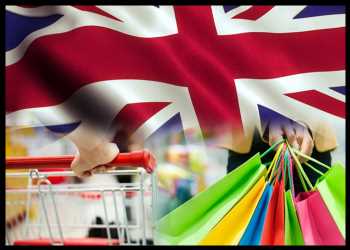UK retail sales unexpectedly recovered in July as promotions boosted online sales, while consumer sentiment hit a new record low in August amid the deepening cost of living crisis caused by rising inflation and the bleak economic prospects, separate data revealed Friday.
Retail sales gained 0.3 percent on month, in contrast to the revised 0.2 percent fall in June. Sales were forecast to fall 0.2 percent in July.
Similarly, excluding auto fuel, retail sales rose 0.4 percent, confounding expectations for a drop of 0.2 percent. In June, sales had advanced 0.2 percent.
Overall sales volumes were 2.3 percent above their pre-coronavirus February 2020 levels.
Food store sales edged up 0.1 percent in July. Non-food stores sales decreased 0.7 percent because of falls in other non-food stores and clothing stores.
Automotive fuel sales decreased 0.9 percent with anecdotal evidence that the heatwave across parts of the UK may have reduced travel and sales, the ONS said.
On a yearly basis, the retail sales volume declined at a slower pace of 3.4 percent after easing 6.1 percent in June. Nonetheless, the pace of decrease was slightly faster than economists’ forecast of -3.3 percent.
Likewise, the annual fall in retail sales, excluding auto fuel, eased to 3.0 percent from 6.2 percent in the previous month. The expected rate of fall was 3.1 percent.
The proportion of retail sales online rose to 26.3 percent in July from 25.3 percent in June.
The GfK consumer sentiment index fell to -44 in August, the weakest since records began in 1974, from -41 in July.
“A sense of exasperation about the UK’s economy is the biggest driver of these findings,” Joe Staton, Client Strategy Director at GfK said. “These findings point to a sense of capitulation, of financial events moving far beyond the control of ordinary people.”
The index measuring changes in past personal finances fell two points to -25 and the forecast for personal finances slid five points to -31.
Likewise, the measure for the general economic situation dropped two points to -68 and that for future economic situation fell three points to -60.
The major purchase index decreased by four points in August to -38, the survey showed. Meanwhile, the savings index rose five points to 18.
Source: Read Full Article
-
SDA Launches 10 Satellites That Help Track Missile Threats
-
Morrissey Condemns Music Industry For Not Supporting Sinead O’Connor While She Lived
-
Biden In London; Meets Sunak On Day 1 Of His Europe Tour
-
‘2 to 3 years before small car market revives’
-
How Far The World’s 18 Most Powerful Missiles Can Travel

